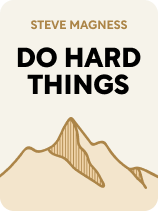

This article is an excerpt from the Shortform book guide to "Do Hard Things" by Steve Magness. Shortform has the world's best summaries and analyses of books you should be reading.
Like this article? Sign up for a free trial here.
Are you struggling to lift yourself up? How can you be more confident in yourself?
In Do Hard Things, Steve Magness argues that to properly gain resilience, you must develop inner confidence. This confidence has to be based on a realistic understanding and acceptance of your abilities.
Continue reading to learn how to be more confident in yourself every day.
Build Inner Confidence
Figuring out how to be more confident in yourself is important because it keeps your insecurities or doubts from taking over when you face difficult situations. When we doubt ourselves, we may feel we aren’t capable of accomplishing the task at hand. Old-school toughness is more concerned with the appearance of confidence, which isn’t based on reality and thus doesn’t help when doubts and insecurities arise.
The self-esteem movement of the ’80s and ’90s is an example of how false confidence can be harmful. People constantly told their children that they were special and that they could achieve anything they put their minds to. But this ideology leads to overconfidence—people believing they’re more capable than they actually are. When this overconfidence meets reality, it can be discouraging and demotivating to realize that you’re not as capable as you believed. To counteract such false confidence, we should focus on gaining real experience and understanding our capabilities.
(Shortform note: In Barking Up the Wrong Tree, Eric Barker also points to the drawbacks of too much confidence, saying that being too confident can lead us to believe we’re more capable than we actually are and thus make poor decisions. However, instead of working on inner confidence, Barker suggests we ignore self-confidence entirely and work on practicing self-compassion (being kind to yourself). Self-compassion helps you achieve success by decreasing your fear of failure—if you’re kind to yourself when you fail, you won’t be as afraid to fail. Unlike self-confidence, though, Barker claims that self-compassion doesn’t lead to an overestimation of your abilities and thus encourages accurate judgments.)
In order to build inner confidence, Magness provides the following advice:
Shoot for consistency, not all-time highs: Many people base their confidence on their highest achievements—the highest grade they got on a calculus test or the most points they scored in a basketball game. But judging yourself based on your best performance leads you to hold yourself to unrealistic standards, and when you inevitably fail to live up to those standards, it can be demoralizing. Instead of seeking to improve your best performance, look to achieve a higher average. This will lead you to be more confident in your abilities.
(Shortform note: In the world of sports, consistent strong performance is a key to success. Sports psychologists provide some tips on how to consistently perform well that can also be applied to other aspects of your life. The key is to be consistent in all aspects of your training. You need to give a consistent amount of effort when you train and prepare. If you slack off when you practice, you won’t be prepared for when it’s time to perform. Also, you need to maintain a consistently positive mindset, avoiding traps like perfectionism and a fear of failure.)
Accept your weaknesses: Confidence isn’t only about acknowledging what you’re good at, it’s also about knowing you can be good at things even if you have weaknesses. Magness says that if you only focus on your strengths, you aren’t accurately evaluating your capabilities. Real confidence is about believing in yourself despite your weaknesses.
(Shortform note: Though accepting your weaknesses is important, it’s also important not to focus on them too intensely. In StrengthsFinder 2.0, Tom Rath argues that the problem with most self-improvement methods is that they put too much emphasis on correcting weaknesses. The idea of such methods is that if you put in the effort, you can overcome any weakness. However, we all have inherent weaknesses that can’t be easily corrected or overcome. Because of this, we should focus on improving our strengths, as we’ll get more out of the effort we put into it.)

———End of Preview———
Like what you just read? Read the rest of the world's best book summary and analysis of Steve Magness's "Do Hard Things" at Shortform.
Here's what you'll find in our full Do Hard Things summary:
- Why the "old-school" way we think about toughness is wrong
- Why machismo ideals are harmful and ineffective
- How to become resilient and versatile, and how to overcome adversity






